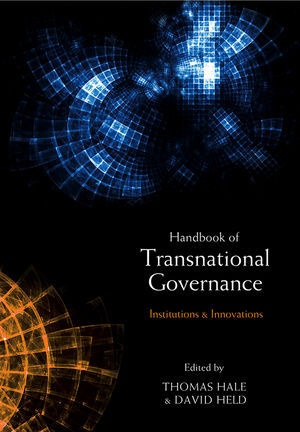Mehr lesen
Informationen zum Autor Thomas Hale is a PhD candidate at Princeton University. David Held , is Graham Wallas Professor of Political Science at the London School of Economics and Political Science. Klappentext When we speak of global governance today, we no longer mean simply state-to-state diplomacy, international treaties, or intergovernmental organizations like the United Nations. Alongside these 'traditional' elements of global politics are a host of new institutions ranging from global networks of governmental officials, to private codes of conduct for corporations, to action-oriented partnerships of NGOs, governments, corporations, and other actors. These innovative mechanisms offer intriguing solutions to pressing transnational challenges as diverse as climate change, financial governance, workers' rights, and public health. But they also raise new questions about the effectiveness and legitimacy of transnational governance.An expanding body of scholarship has sought to identify and assess these new forms of governance, but this young body of work has lacked a sense of the larger picture. This volume seeks to fill that need by presenting a comprehensive overview of new forms of transnational governance. This resource is essential for those who want to explain why transborder governance has changed and to understand what implications these changes have for global politics. Zusammenfassung When we speak of global governance today! we no longer mean simply state-to-state diplomacy! international treaties! or intergovernmental organizations like the United Nations. Alongside these 'traditional' elements of global politics are a host of new institutions ranging from global networks of governmental officials! to private codes of conduct for corporations! to action-oriented partnerships of NGOs! governments! corporations! and other actors. These innovative mechanisms offer intriguing solutions to pressing transnational challenges as diverse as climate change! financial governance! workers' rights! and public health. But they also raise new questions about the effectiveness and legitimacy of transnational governance.An expanding body of scholarship has sought to identify and assess these new forms of governance! but this young body of work has lacked a sense of the larger picture. This volume seeks to fill that need by presenting a comprehensive overview of new forms of transnational governance. This resource is essential for those who want to explain why transborder governance has changed and to understand what implications these changes have for global politics. Inhaltsverzeichnis Notes on Contributors. Preface. 1. Editors' Introduction: Mapping Changes in Transnational Governance ( Thomas N. Hale and David Held ). Transgovernmental Networks. Introduction. 2. Basel Committee on Banking Supervision ( Kevin Young ). 3. Financial Action Task Force ( Ian Roberge ). 4. Financial Stability Board ( Randall Germain ). 5. Group of Twenty ( Jon Kirton ). 6. Global Forum on Transparency and Exchange of Information ( Tony Porter and Veronica Rubio Vega ). 7. International Accounting Standards Board ( Andreas Nölke ). 8. International Association of Insurance Supervisors ( Donato Masciandaro ). 9. International Competition Network ( Marie-Laure Djelic ). 10. International Conference on Harmonization of Technical Requirements for the Registration of Pharmaceutical Products ( Dimitris Katsikas ). 11. International Network for Environmental Compliance and Enforcement ( Durwood Zaelke, Kenneth Markowitz, and Meredith R. Koparova ). 12. Joint Forum ( Kevin Young ). 13. Transnational Policing ( Monica den Boer ). Arbitration bodies. Introduction. 14. Citizen Submission ...

